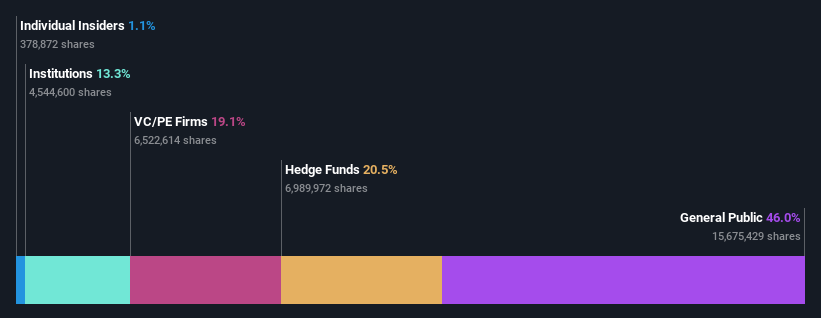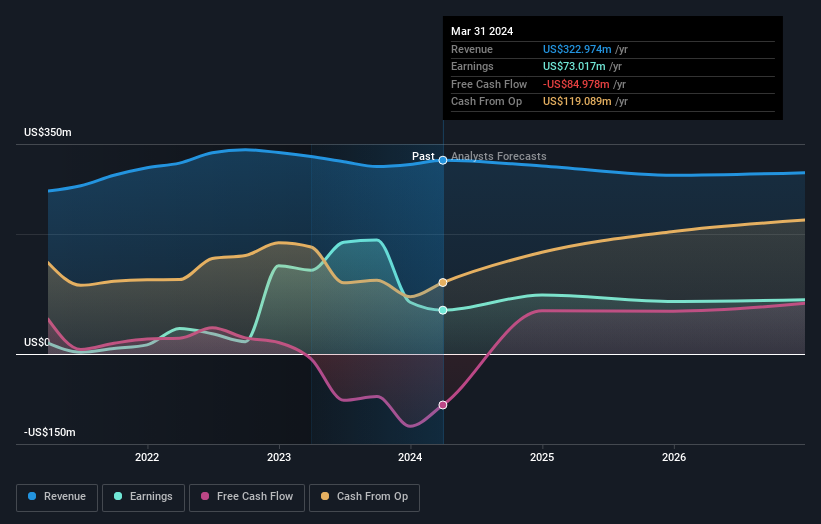While hedge funds own 20% of Canacol Energy Ltd (TSE:CNE), retail investors are its largest shareholders with 46% ownership
Key Insights
The considerable ownership by retail investors in Canacol Energy indicates that they collectively have a greater say in management and business strategy
A total of 5 investors have a majority stake in the company with 51% ownership
If you want to know who really controls Canacol Energy Ltd (TSE:CNE), then you'll have to look at the makeup of its share registry. And the group that holds the biggest piece of the pie are retail investors with 46% ownership. Put another way, the group faces the maximum upside potential (or downside risk).
Meanwhile, hedge funds make up 20% of the company’s shareholders.
Let's take a closer look to see what the different types of shareholders can tell us about Canacol Energy.
See our latest analysis for Canacol Energy
What Does The Institutional Ownership Tell Us About Canacol Energy?
Many institutions measure their performance against an index that approximates the local market. So they usually pay more attention to companies that are included in major indices.
Canacol Energy already has institutions on the share registry. Indeed, they own a respectable stake in the company. This suggests some credibility amongst professional investors. But we can't rely on that fact alone since institutions make bad investments sometimes, just like everyone does. When multiple institutions own a stock, there's always a risk that they are in a 'crowded trade'. When such a trade goes wrong, multiple parties may compete to sell stock fast. This risk is higher in a company without a history of growth. You can see Canacol Energy's historic earnings and revenue below, but keep in mind there's always more to the story.
Our data indicates that hedge funds own 20% of Canacol Energy. That catches my attention because hedge funds sometimes try to influence management, or bring about changes that will create near term value for shareholders. Our data shows that Fourth Sail Capital LP is the largest shareholder with 20% of shares outstanding. With 19% and 5.4% of the shares outstanding respectively, Cavengas Holdings S.R.L and Cobas Asset Management, SGIIC, SA are the second and third largest shareholders. Additionally, the company's CEO Charle Gamba directly holds 0.5% of the total shares outstanding.
To make our study more interesting, we found that the top 5 shareholders control more than half of the company which implies that this group has considerable sway over the company's decision-making.
Researching institutional ownership is a good way to gauge and filter a stock's expected performance. The same can be achieved by studying analyst sentiments. There is some analyst coverage of the stock, but it could still become more well known, with time.
Insider Ownership Of Canacol Energy
The definition of company insiders can be subjective and does vary between jurisdictions. Our data reflects individual insiders, capturing board members at the very least. Management ultimately answers to the board. However, it is not uncommon for managers to be executive board members, especially if they are a founder or the CEO.
Insider ownership is positive when it signals leadership are thinking like the true owners of the company. However, high insider ownership can also give immense power to a small group within the company. This can be negative in some circumstances.
Shareholders would probably be interested to learn that insiders own shares in Canacol Energy Ltd. It has a market capitalization of just CA$147m, and insiders have CA$1.6m worth of shares, in their own names. Some would say this shows alignment of interests between shareholders and the board, though we generally prefer to see bigger insider holdings. But it might be worth checking if those insiders have been selling.
General Public Ownership
The general public, who are usually individual investors, hold a 46% stake in Canacol Energy. While this size of ownership may not be enough to sway a policy decision in their favour, they can still make a collective impact on company policies.
Private Equity Ownership
With a stake of 19%, private equity firms could influence the Canacol Energy board. Some investors might be encouraged by this, since private equity are sometimes able to encourage strategies that help the market see the value in the company. Alternatively, those holders might be exiting the investment after taking it public.
Next Steps:
While it is well worth considering the different groups that own a company, there are other factors that are even more important. To that end, you should learn about the 3 warning signs we've spotted with Canacol Energy (including 1 which is potentially serious) .
If you would prefer discover what analysts are predicting in terms of future growth, do not miss this free report on analyst forecasts.
NB: Figures in this article are calculated using data from the last twelve months, which refer to the 12-month period ending on the last date of the month the financial statement is dated. This may not be consistent with full year annual report figures.
Have feedback on this article? Concerned about the content? Get in touch with us directly. Alternatively, email editorial-team (at) simplywallst.com.
This article by Simply Wall St is general in nature. We provide commentary based on historical data and analyst forecasts only using an unbiased methodology and our articles are not intended to be financial advice. It does not constitute a recommendation to buy or sell any stock, and does not take account of your objectives, or your financial situation. We aim to bring you long-term focused analysis driven by fundamental data. Note that our analysis may not factor in the latest price-sensitive company announcements or qualitative material. Simply Wall St has no position in any stocks mentioned.

 Yahoo Finance
Yahoo Finance 

